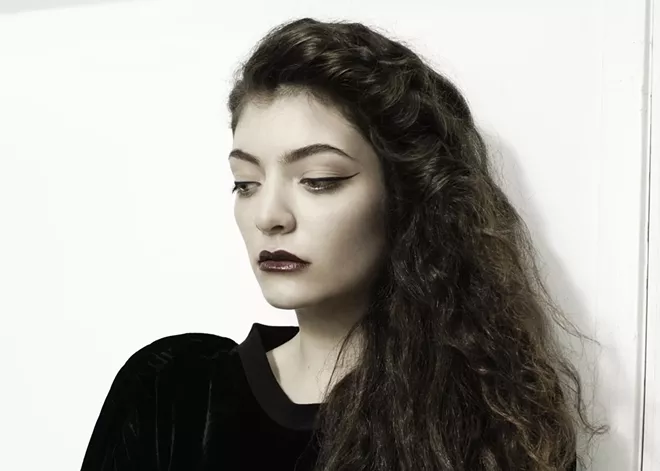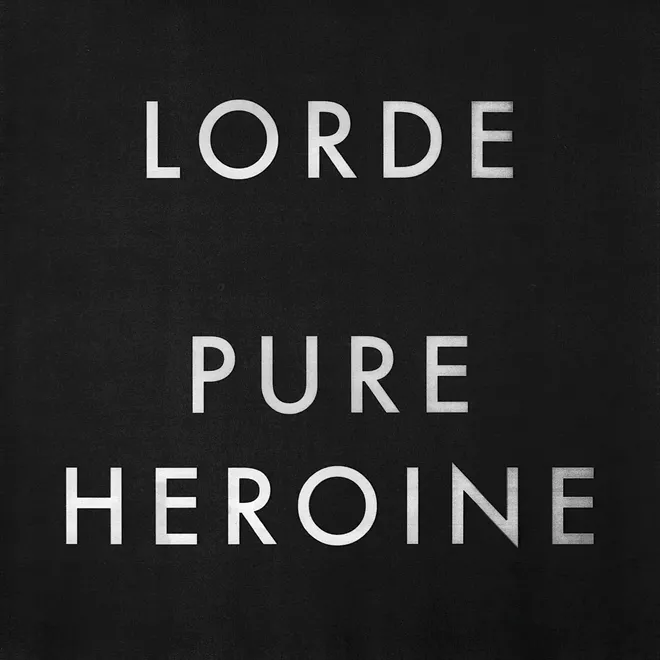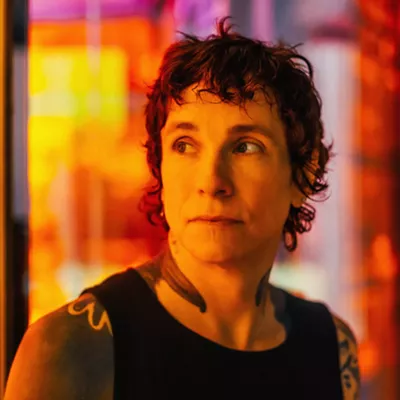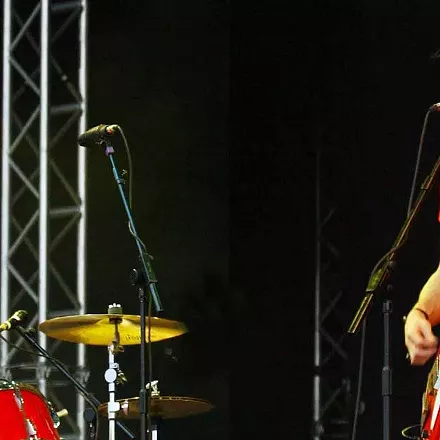
"Don't you think that it's boring how people talk?"
As an opening salvo, that line doesn't exactly connote a paradigm-shifting moment. When delivered by a 16-year-old, the inclination might be to simply shrug it off as typical bratty teenage self-importance.
But when you actually hear Ella Yelich-O'Connor (aka Lorde) sing the first line of Pure Heroine, it's instantly clear that any preconceived notions need to be incinerated so that you can bask in the glow of their outdated flickering embers. Over swelling synths and bass-heavy beats, Lorde presents the "Tennis Court" lyrics not as an angst-riddled kid, but with a stoic grace that belies her age. It's not a pithy complaint, but a thesis statement. Just as the drone of people chatter can be a bore, cycles of pop music can similarly get tiresome.
The arrival of Lorde's Pure Heroine, which turns a decade old this week, put a jolt into the doldrums of the pop music world in an indelible way. It's one of the most influential records in recent memory.
It's also the best album of the past decade.
It might be boring how people talk, but there isn't a single boring moment across Pure Heroine.
At its very core, Pure Heroine is an album about isolation and how one wrestles with trying to break out of that to experience the world and feel more seen. It's a natural starting point for Lorde, a literal kid growing up in Auckland, New Zealand. While Auckland may be a metroplex, the island nature of New Zealand breeds a sense of disconnect from the world. Those feelings radiate throughout every fiber of Pure Heroine's being.
On a purely musical level, this is expressed through sparse pop minimalism. It may be easy to overlook now, but Lorde mainstreamed bedroom pop — productions centered on minimal instrumentation that one could conceivably concoct in their bedroom thanks to the advance of electronic musical technology. Along with producer Joel Little, Lorde created an electropop soundscape of synth swells and twitchy programmed drum beats that captured the anxious feeling of being young and alone with your overwrought thoughts.
One only needs to glance at the Billboard charts during the year of Pure Heroine's arrival to see how much of a departure this sound was from the hyper-overproduced pop of the era. Sitting above "Royals" on the 2013 year-end charts were songs that did everything in their power to sound big, bombastic and digitally layered within an inch of their life: Katy Perry's "Roar," Imagine Dragons' "Radioactive," Justin Timberlake's "Mirrors," etc. Since most artists were approaching pop music as if it needed to be a tidal wave of noise, Lorde's uncluttered production instantly stood out as something fresh. It didn't come off as feeling like a world conquering force. This wasn't someone out here seeking legions of stans, Lorde simply sounded like she was looking for a friend to make the quiet moments a bit less lonely.
It's extremely hard to imagine the decade of pop music that has followed Pure Heroine's release being anywhere close to the same without Lorde breaking down that bedroom pop door and letting those new friends into her welcoming space. Would other teen superstars who clearly drew from the Lorde playbook have taken over the industry without Pure Heroine? Perhaps. But the ease with which the lines can be drawn between the album and subsequent star-making pop events like Billie Eilish's album When We All Fall Asleep, Where Do We Go? and Olivia Rodrigo's song "drivers license" suggests that a whole generation of pop stars should still be paying reverence to their Lorde.
For starters, it's the point of view. Lorde's lyrics across the album are sung from a much lower status than most pop music. It's not merely an underdog perspective, but one where you're scrapping for slivers of hope and moments of joyful solitude in the face of the world moving swiftly on around you with totally uncaring nihilism. At times it's overwhelming and the world simply seems far too big in your little Kiwi alcove. Pop stars are supposed to be beacons of brashness, but Lorde is more often found to be underconfident across Pure Heroine. And most of us can relate to that feeling more than to untouchable superstar bravado.
And while it's one of the most remarkable pieces of teenage art out there, it's stunning how Lorde's writing manages to both clearly be from a teen girl perspective without ever feeling kiddie or flippant. Part of this comes from the strength of her voice and lyrical delivery. She can dip into a smokey contralto to set a snearing-at-bling-excess tone on "Royals" and then easily shift to a soprano on the uneasy summer memories jam "Buzzcut Season." Youthful uncertainty can be felt in the anxious beats of "Ribs" and lines like "My mom and dad let me stay home / It drives you crazy getting old" showcase that Lorde is a spring chicken, but her overall writing carries a sense of weathered wisdom. Take, for example, "Still Sane" where she wrestles with the fear of fame ("Only bad people live to see their likeness set in stone"), which feels like a little prayer of warning for her future self.
The album also doesn't shy away from being darker than most mainstream-targeting pop. On Pure Heroine, Lorde comes across as more of a goth girl who has the album art of the Cure's Disintegration taped to the inside of her locker than the pop princess prom queen. If we're being real, darkness is more universal than light. Not everyone lives upbeat pop lives, but even those who do have solitary moments of crushing doubt. That Lorde is able to express that inherently makes her feel more authentic and relatable than her pop contemporaries at the time.
Another relatable element that one might not expect from a 2010s teen comes via the anti-tech undercurrent that runs throughout Pure Heroine. While a touch ironic because of the electronic production, it's clear Lorde was wrestling with the digital world around her in a way that even most adults at the time weren't considering. When she sings "God knows we like archaic kinds of fun" on "Glory and Gore," you believe it. There's a constant note of wanting to escape to a less complicated place (be it tennis courts or otherwise). She may give a laughing nod to her Tumblr dashboard on "White Teeth Teens," but more often she's wanting to get away from the world of her peers. This is most evident in Pure Heroine's best track, the album-closing "A World Alone," a slow-build anthem to finding outsider love in an overly hectic world. As the refrain bemoans how "the people are talking, people are talking" it's clear that it's not just the irl folks she's discussing ("Maybe the Internet raised us / Or maybe people are jerks"). In a world of digital kineticism, Lorde just wants to get still.
Even though they're the thoughts of a 16-year-old girl, nothing feels hyper-specific in a way that might detach a listener's empathetic connection. It's a cascading sonic series of we've all felt this way at some point moments. On Pure Heroine, Lorde doesn't sing at you. She wants you along for the ride with her.
Lorde's follow-up album, 2017's Melodrama, stands as another pop masterpiece, but it does shift into more personalized territory. Anecdotally, the album is beloved among folks who were young women when the record dropped, because Lorde brilliantly explores the messiness of being a young, lovesick and mistake-prone 20-something with both fierce swagger and heart-wrenching vulnerability. And while it'd be absurd to change a single thing about Melodrama's artful exploration of those feelings, it's just factually harder for that to connect with the atypical pop audiences that Pure Heroine brought to the table who don't happen to fit into that young female demographic.
For all the criticism hurled at Lorde's third LP, 2021's Solar Power, the main issue with the record is how far it drifts away from universality. In a way, Solar Power finds Lorde becoming the bougie type that she once bemoaned on "Royals." Sorry, but the people who can relate to being stoned in a nail salon or casually tossing their cellphone in the water to get off the grid is decidedly a tiny and targeted niche. (The album's aesthetic presentation of a pseudo-private beach hang while people were still struggling with COVID isolation at the time of its arrival certainly didn't help things.) But any latter missteps in the sand don't diminish Pure Heroine in the slightest.
The world may be littered with boring talkative people making boring art, but Ella Yelich-O'Connor isn't one of them. In the face of any "Royals" misgivings, Pure Heroine shines like a flawless royal diamond. But if the bores lob criticism Lorde's way, there's only one worthy response — the same line Lorde delivers with cheekily uncaring and above-it-all detachment to close Pure Heroine.
"Let 'em talk..." ♦




























